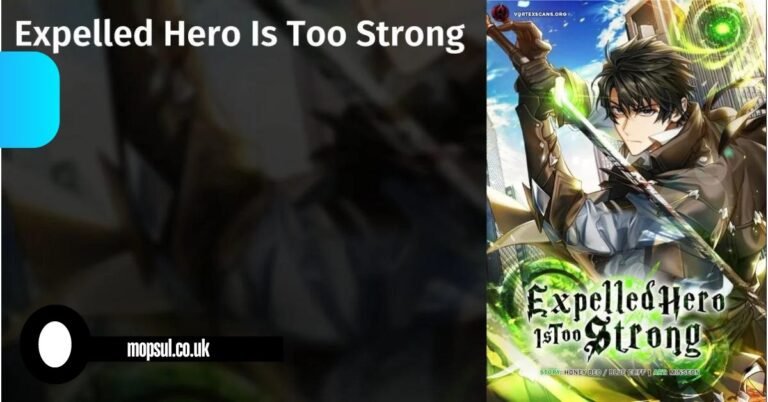Fantasy literature has a knack for taking pictures of our imagination, and one trope that has recently taken the middle stage is the “Expelled Hero is to Strong” phenomenon. This fascinating narrative device now entertains and resonates deeply with readers. In this blog post, we will explore the intricacies of this trope, its appeal, and its effect on the delusion genre.
Table of Contents
Introduction
Have you ever been captivated by a fantasy novel where the protagonist, initially deemed unworthy or weak, is expelled only to return more powerful than anyone could have imagined? This is the world of the ‘Expelled Hero is to Strong’ trope, a concept that has become a staple in modern fantasy literature, enthralling readers with stories of redemption and unexpected power.
The reputation of this trope has soared in recent years, shooting the hearts of delusion enthusiasts worldwide. In this weblog, we’ll dissect its origins, discover its appeal, and spotlight a few high-quality examples. By the end, you will have a deeper appreciation for why this narrative tool is so loved.
Understanding the Tropes
The “Expelled Hero is to Strong” trope is rooted in the traditional underdog story. It commonly includes a hero who, for diverse reasons, is forged out of their community or organization. Initially perceived as vulnerable or unworthy, the hero undergoes widespread growth and returns with newfound strength, regularly surpassing people who once doubted them.
This trope draws from undying subject matters of resilience and redemption. It’s a form of poetic justice where the protagonist’s expulsion sets the level for his or her eventual triumph. When in comparison to related tropes like the ‘Chosen One’ (a character chosen by destiny to fulfill a significant role in a story) or the ‘Hero’s Journey’ (a narrative pattern identified by Joseph Campbell that involves a hero who goes on an adventure, faces and overcomes a crisis, and returns home transformed), this trope sticks out because of its unique combination of betrayal and retribution.
Narratives featuring the “Expelled Hero is to Strong” trope often include factors of training, hidden ability, and dramatic comebacks. These memories captivate readers by showcasing transformation and the remaining victory of the underdog.
Breaking Down the Appeal
Why does the ‘Expelled Hero is to Strong’ trope resonate profoundly with readers? The answer lies in its universal themes and profound emotional impact. At its core, this trope speaks to the human desire for validation and triumph over adversity.
Character development is critical to the allure of the ‘Expelled Hero is to Strong’ trope. Readers are drawn to protagonists who grow and evolve, especially when faced with insurmountable challenges. The hero’s transformation from weakness to strength creates a compelling narrative arc that engages readers.
Plot dynamics also play a vital role. The preliminary expulsion sets the level for excessive-stakes drama and struggle, even as the hero’s return guarantees a satisfying decision. This combination of hysteria and triumph makes for an attractive and emotionally worthwhile reading experience.
Notable Examples
Several delusion novels have masterfully done the “Expelled Hero is to Strong” trope, leaving an enduring impression on readers. Let’s take a look at some standout examples:
- “The Name of the Wind” using Patrick Rothfuss:
Kvothe, the protagonist, is expelled from the distinguished University because of his unconventional strategies and private conflicts. His subsequent adventures and increase showcase his high-quality talents, making his eventual go-back more impactful.
- “Harry Potter and the Order of the Phoenix” via J.K. Rowling:
Although Harry isn’t formally expelled, he faces full-size ostracism and doubt from the wizarding community. His endured fight against dark forces and his eventual triumph spotlight his resilience and electricity.
- “The Way of Kings” by Brandon Sanderson:
Kaladin, who began as a slave and was considered insignificant, rose to become a formidable warrior and chief. His transformation is a testimony to his internal electricity and determination.
These examples illustrate how the trope may be effectively woven into unique narrative systems, creating memorable and galvanizing tales.
Impact on the Genre
The impact of the ‘Expelled Hero is to Strong’ trope on the delusion genre can’t be overstated. It has enriched the storytelling landscape and stimulated countless authors to experiment with issues of resilience and redemption. Moreover, this trope has also influenced other genres and media, such as movies and video games, where stories of underdogs rising to power are often celebrated.
Authors and readers alike are drawn to this trope’s emotional intensity and complexity. It permits the improvement of wealthy persons and explores the nuances of human strength and vulnerability. By complex protagonists to upward thrust above their instances, this trope fosters a deeper connection between readers and the story.
Conclusion
The “Expelled Hero is to Strong” trope has carved out a massive region in fantasy literature. Its familiar themes of resilience, redemption, and triumph resonate with readers profoundly. From Kvothe’s daring exploits to Kaladin’s upward thrust from slavery, these testimonies remind us of the electricity of the human spirit.
If you are a fable enthusiast, look for this trope in your subsequent read. Its timeless appeal and emotional impact are sure to leave a lasting impression. Remember, each hero’s journey is specific, but the electricity they discover inside themselves is what, without a doubt, makes their story unforgettable.


